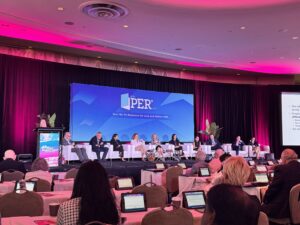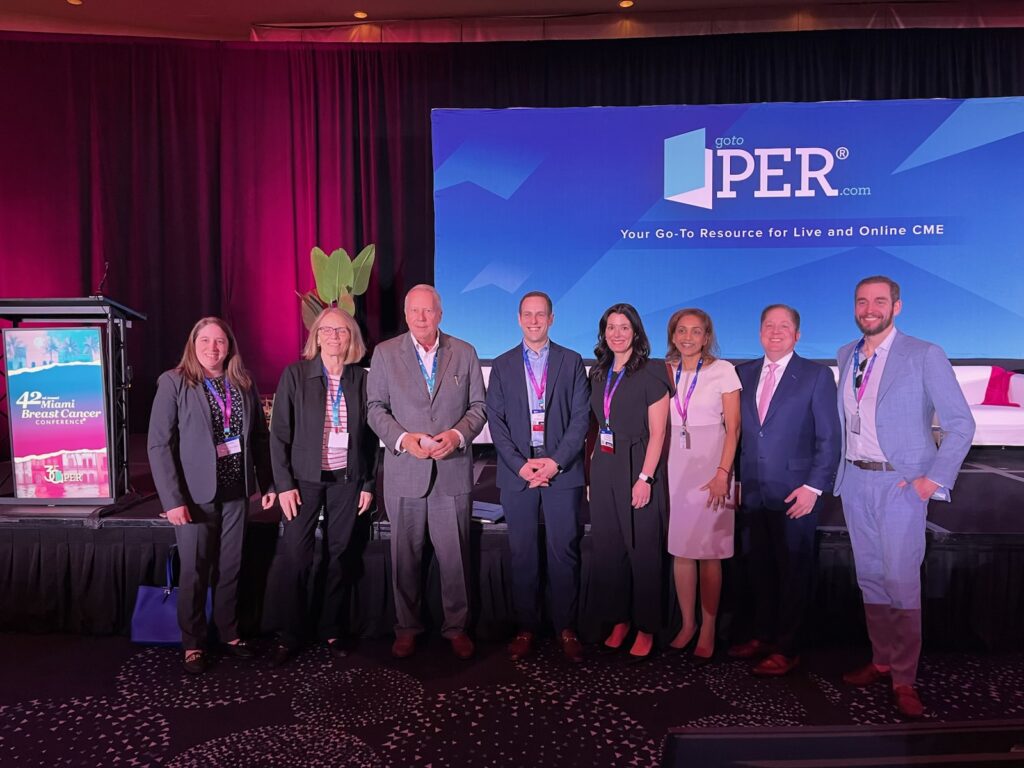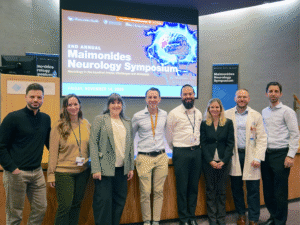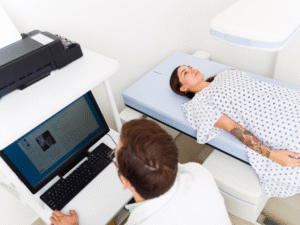Breast cancer is still the most commonly diagnosed cancer among women in the United States¹. It accounts for nearly one-third of new female cancer cases each year. As the fight against this disease continues, there is a growing need for collaboration, innovation, and clinical advances.
Maimonides Health remains a leader in breast cancer treatment and research. Recognized as Brooklyn’s first and only fully accredited breast center, Maimonides is known for its cutting-edge diagnostics and comprehensive, team-based approach to care. This reputation extends beyond New York—thanks in part to Maimonides Cancer Center’s influential presence at one of the nation’s most prestigious oncology events: the Miami Breast Cancer Conference.
Maimonides Makes Its Mark
For more than four decades, the Miami Breast Cancer Conference has brought together leaders in breast oncology. Surgeons, oncologists, radiologists, pathologists, and other specialists gather to advance cancer treatments and outcomes.
For the 12th consecutive year, Patrick Borgen, MD, Chair of Surgery and Director of the Maimonides Breast Center, served as program chair. Dr. Borgen has helped guide the agenda and spotlight the field’s most pressing issues.
“The Miami Breast Cancer Conference plays a vital role in shaping the future of breast cancer care,” says Dr. Borgen. “It’s an honor to lead this gathering of passionate clinicians and researchers working together to push the boundaries of what’s possible for patients.”
Advancing Breast Cancer Care on a National Stage
Maimonides was well represented again this year at the Miami Breast Cancer Conference, with several providers presenting new research findings, clinical insights, and best practices that are helping to redefine care for patients everywhere.
 The day one welcome session featured a debate-style discussion with national breast cancer leaders. Described as a “World-Class Tumor Board,” this panel of experts discussed real-world, anonymized cases from patients at Maimonides.
The day one welcome session featured a debate-style discussion with national breast cancer leaders. Described as a “World-Class Tumor Board,” this panel of experts discussed real-world, anonymized cases from patients at Maimonides.
The panel included Maimonides experts Dr. Borgen, breast reconstructive surgeon Brian Cohen, MD, breast surgeon Joshua Feinberg, MD, radiation oncologist Fleure Gallant, MD, and radiologist Jessica Torrente, MD.
“This was a chance for our team to sit alongside other national leaders in our field and discuss patient cases the way we do at Maimonides in our weekly tumor board meetings,” Dr. Borgen says. “The multidisciplinary input we gathered at the conference mimics the input we get on each patient case at Maimonides and gave the conference audience a glimpse of part of our process to provide an elevated level of care.”
Other Miami Breast Cancer Conference presentations included:
Limitations of ‘Dr. Google’
Dr. Feinberg presented research evaluating the accuracy of artificial intelligence tools. His presentation, titled “Limitations of Dr. Google,” showcased the results of a study comparing performance of popular interactive AI chat tools on the Breast Evaluation and Self-Assessment Program (BESAP) to that of breast fellows.
The idea arose from a similar study performed in the Maimonides Division of Vascular Surgery by vascular surgery fellow Becky Long, MD.
Dr. Feinberg shared that ChatGPT and Google Gemini have essentially “read” all the textbooks in the world, and he says, “You could consider them the smartest students we’ve ever seen.”
However, these AI tools answer only about 75% of questions correctly.
“This means that these tools either are not as smart as we think, or perhaps the questions are tapping into an area of decision-making or test-taking strategy not yet developed in these large language models,” Dr. Feinberg says.
Dr. Feinberg’s team is evaluating whether accuracy improves when we restrict the chatbots’ access to only specific internet sources with the most relevant and factual information, as opposed to all internet sources.
“In an era in which both patients and physicians increasingly utilize artificial intelligence tools, one must maintain a degree of caution when relying on the information generated,” Dr. Feinberg says. “And we as clinicians need to work with AI researchers and data scientists to guide how we use AI to advance our field and benefit our patients.”
Innovations in Non-opioid Pain Management
The 2025 Miami Breast Cancer Conference again included an interactive session on non-opioid pain management strategies, part of the Maimonides Enhanced Recovery After Surgery (ERAS) program.
During this session, attendees heard from Dr. Borgen, Dr. Feinberg, and Gary Schwartz, MD, Vice Chair of Pain Management and Anesthesiology at Maimonides.
A session highlight was the growing use of cryoanalgesia, sometimes called cryoneurolysis. This technique uses cold temperatures to freeze and temporarily turn off pain-transmitting nerves.
Using a needle and ultrasound guidance, clinicians can target the intercostal nerves that come off the ribs and innervate breast tissue with a freezing technique that forms an “ice ball” around the nerve.
“We can form an ice ball through a needle and block these nerves, pretty much stopping the pain signal for up to a couple of months,” Dr. Schwartz says. “That allows patients to recover with less pain. It also means they take fewer opiates postoperatively.”
For patients, cryoanalgesia offers an attractive option: lasting relief without daily pills or uncomfortable side effects.
“It’s not systemic, it’s nothing addictive, and we can repeat it,” Dr. Schwartz says. “It decreases pain with minimal side effects, and it’s a one-time treatment that lasts months, as an alternative to taking a pill every day.”
The procedure is FDA-approved and already in use beyond breast surgery—for example, in orthopedic cases like total knee replacement and in chronic pain management for conditions like rib fractures or certain types of headaches.
One notable benefit of cryoanalgesia is that it can be used multiple times and at different points in a patient’s treatment plan. This flexibility makes it an ideal tool for managing pain across the course of care, from surgery to reconstruction and beyond.
The session emphasized that pain management is not just about immediate comfort—it’s about the patient’s overall journey through cancer care.
“Breast cancer patients have a lot going on,” Dr. Schwartz says. “They find out they have cancer. Some learn they have to have their breast removed and have reconstructive surgery. Then there’s the possibility of chemotherapy and radiation. It’s a lot to take.”
Financial Toxicity
Financial toxicity is the distress patients experience due to the out-of-pocket costs associated with medical care.
“This burden can be especially significant for cancer patients,” says Amanda Reynolds, MD, general surgery rising chief resident at Maimonides Medical Center, who presented early results of an ongoing study on financial toxicity at the 2025 Miami Breast Cancer Conference. “Maimonides Medical Center serves a diverse and often vulnerable patient population. Financial toxicity can negatively impact not only a patient’s quality of life but also their adherence to treatment and overall survival outcomes.”
Dr. Reynolds, working under the guidance of co-principal investigators Dr. Feinberg and Maimonides Radiation Oncologist Johnathan Klein, MD, MSc, shared data showing that financial toxicity did not worsen for study participants during the first six months of treatment following a cancer diagnosis.
“The results were somewhat surprising, as one might expect patients to perceive more financial issues throughouttreatment as they need more and more appointments, tests, and treatments,” Dr. Reynolds says, adding a few potential explanations. These include:
- Diagnosis: The patients in this preliminary analysis were diagnosed with early-stage breast cancer, which typically involves a less intensive and shorter treatment course compared to more advanced stages. It’spossible, Dr. Reynolds says, that these patients don’t experience as much financial burden throughouttreatment compared to people receiving care for other diagnoses that might have different cost considerations.
- Existing burden: Because medical care can be so expensive, it may be that patients already feel financially burdened by the time they start their treatments for breast cancer. “They may already feel so burdened by the time they start the study that there isn’t much perception of a further increase in financial problems,” Dr. Reynolds says.
- Sound support systems: It may be that the patients’ support systems are so good that they don’t perceive any worsening in their financial situation throughout their treatment.
- Not enough data: Dr. Reynolds presented a preliminary analysis of the first 26 patient participants in the financial toxicity study. There may not be enough data yet to detect a difference in reported financial toxicity over six months of treatment.
“We don’t know which, if any, of these explanations is the correct one yet,” Dr. Reynolds says. “But we are hoping to finish collecting data on our entire patient group of 100-plus patients this year to gain a better understanding.”
Dr. Reynolds and team also plan to extend the follow-up period to 12 months to assess longer-term trends in financial toxicity. In addition, they plan to:
- Include more patients with late-stage breast cancer to evaluate whether disease stage influences financial burden differently over time
- Try to determine the precise causes of financial toxicity
- Design and test interventions to help improve patients’ financial and overall well-being
A Favorite Among Providers
The Miami Breast Cancer Conference is a favorite among cancer providers because it promotes the spirit of treating the whole patient and being by each patient’s side throughout their difficult journeys. The conference’s “Hear it on Friday, use it on Monday” approach highlights its emphasis on practical applications that advance breast cancer care.
“This is one of my favorite conferences of the year,” Dr. Schwartz says. “It’s for the benefit of patients. There is time during the conference to deal with the cancer diagnoses and treatments, but it’s clear that organizers also care about the whole patient experience and giving patients the best chance of success in their journey to recovery.”
Maimonides Cancer Center and our breast cancer specialists provide advanced, comprehensive breast cancer care. Learn more about our Breast Center and Breast Cancer Screening Program. To refer a patient, call 718-765-2550.




